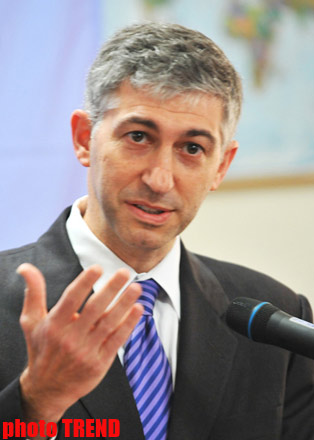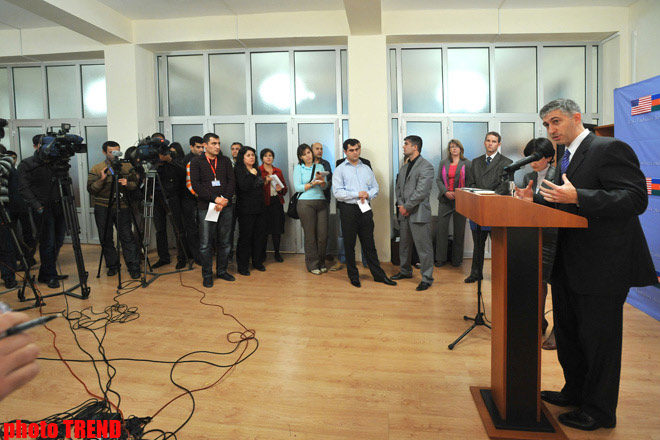EDITOR's NOTE: photos, details and penultimate paragraph added
Azerbaijan, Baku, Oct.19 / Trend, T.Konyayeva /
It is necessary to develop common measures to protect Azerbaijan's financial system from the threat posed by Iran, to help to protect the reputation of the country's financial sector and to attract investments to the country, the U.S. Treasury Undersecretary for Terrorism and Financial Intelligence Stuart Levey said today at a press conference in Baku.
"As it was repeatedly stressed, Azerbaijan is an important strategic partner of the United States. Thus, the U.S. and Azerbaijan's positions should be brought together on Iran's nuclear program," Levey said.
He said Iran is a threat not only to the region's countries, but for the whole world, and, given the geographical proximity of Azerbaijan and Iran, Baku must be more vigilant.
Now I cannot divulge details of discussions with the Azerbaijani officials, and there are not any separately recommended lists of Iranian companies, which are dangerous for Azerbaijan, Levey added.
He said no specific list has been submitted to Azerbaijan.
"We just discussed issues how to predict the risks that the Iranian nuclear program may cause to the financial system of Azerbaijan," Levey said.
The U.S. and other Western countries accuse Iran of developing nuclear weapons for military purposes under the guise of peaceful nuclear energy program. Tehran denies the charges, saying that its nuclear program is aimed solely at meeting the country's electricity needs. The U.N. Security Council adopted six resolutions in connection with the suspension of Iran's nuclear program.
The UN Security Council adopted another resolution, which provides for tougher sanctions against Tehran in connection with its refusal to cease its uranium enrichment June 9, 2010. This is the fourth resolution, adopted by the Security Council because of Tehran's unwillingness to comply with international requirements concerning the clarification of several issues of the world community over the Iranian nuclear program, including the existence of the military component.
A new document of the Security Council provides for new restrictions against Iranian banks abroad, if there is suspicion that they are relevant to the development of Iran's nuclear or missile programs as well as against the insurance system, besides inspections on Iranian ships and shipping restrictions on the country.
To the Trend's question whether there any joint projects between Iran and Azerbaijan, which violate the requirements of the latest UN Security Council resolution 1929, Levey said that the U.S. does not currently have such information.
Levey said one must be vigilant during implementing such projects, because the UN Security Council's resolution states that there is a relation between Iran's energy sector and its nuclear developments.
"My visit aims, in general, at holding consultations with representatives of the Azerbaijani government on the joint measures to protect the international financial system from the threat of the Iranian nuclear program and to fulfill the UN Security Council resolutions," he stressed.








